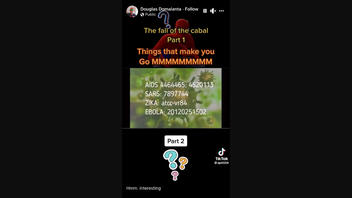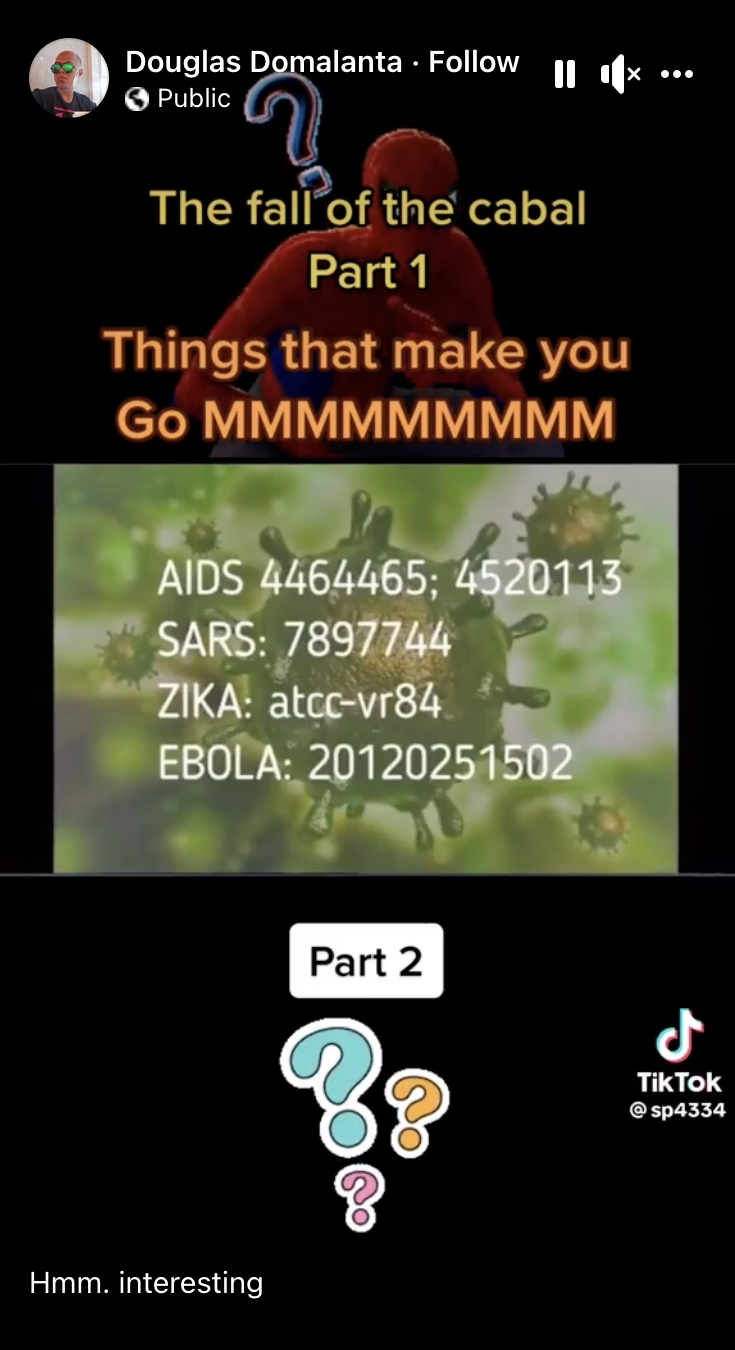
Do patents related to the diseases AIDS, SARS, Zika and Ebola prove that they were man-made? No, that's not true: Three of the patents cited are associated with those diseases but they are not for the creation or invention of them. There is no mention in any of the patents that indicates the applicants fabricated the viruses. The Zika virus "patent" mentioned in the claim does not exist.
The claim appeared in a video (archived here) where it was published on Facebook on May 4, 2023, under the title "Things that make you Go MMMMMMMMM."
The video opened with a voice saying:
Now I'm going to give you five more. Although I could go on forever. Counting down number five. Did you know that diseases such as AIDS, Zika, SARS and Ebola are actually patented? Do you know when something is patented? When it's man-made. Man-made diseases, are you kidding me?
This is what the post looked like on Facebook at the time of writing:
(Source: Facebook screenshot taken on Mon May 8 19:37:01 2023 UTC)
The video has a caption in the beginning that reads, "The fall of the cabal Part 1," and makes several claims. This fact check is focused only on the claims regarding the patents.
The patents listed in the video are:
AIDS: 4464465, 4520113
SARS: 7897744
Zika: atcc-vr84
Ebola: 20120251502
U.S. Patent 4464465 expired in 2002 and was a patent for a technique to produce monoclonal antibodies:
Novel method, cells and compositions are provided involving transforming B-lymphocytes to provide immortalization for continuous production of monoclonal antibodies to a predetermined ligand.
U.S. Patent 4520113 expired in 2004 and was a patent for a technique to detect antibodies, "in sera of AIDS and pre-AIDS patients and describes the biochemical and immunological analysis of antigens associated with the virus HTLV-III Human T-Cell Leukemia Virus."
Neither patent claims to have invented the AIDS virus.
SARS: 7897744
U.S. Patent 7897744 was for the "genomic sequence" of the SARS (severe acute respiratory syndrome) virus which "may be used, for example, for the diagnosis, prophylaxis, or therapy of a variety of SARS virus related disorders." The Public Health Agency of Canada applied for the patent in 2004, two years after the virus was first identified, nothing the sequences may used for diagnosing or treating SARS "related disorders":
The invention provides, in part, the genomic sequence of a putative coronavirus, the SARS virus, and provides novel nucleic acid and amino acid sequences that may be used, for example, for the diagnosis, prophylaxis, or therapy of a variety of SARS virus related disorders.
The patent does not claim to have invented SARS.
Zika: atcc-vr84
This is not a U.S. Patent. "Vr84" is the name of a Zika virus strain that is available to purchase on the nonprofit ATCC (American Type Culture Collection) website. The organization describes itself as a "global biological resource center and standards organization and the leading developer and supplier of authenticated cells lines and microorganisms." Researchers use such cell lines to test counter-measures to the Zika virus.
Ebola: 20120251502
U.S. Patent 20120251502 was applied for by the CDC (Centers for Disease Control and Prevention) in 2007 "based on the identification of a new Ebola virus isolated from a patient in Bundibugyo, Uganda." It was not invented by the CDC but the patent was requested so companies can use the virus strain to possibly create vaccines and also to prevent companies from limiting research of the virus:
In 2007, CDC applied for a patent based on the identification of a new Ebola virus isolated from a patient in Bundibugyo, Uganda. The virus is now called Bundibugyo virus (species Bundibugyo ebolavirus), but in some literature is also called EboBun. That patent application is still in process. One major reason that the government may patent a biological substance such as EboBun is so that it can grant rights to use the virus strain for the commercialization of diagnostics, vaccines, and antibody/antigen testing, and make them more quickly and readily available to patients, doctors and research scientists. Another reason for patenting is to ensure that another entity does not acquire a patent in a similar space and restrict the beneficial uses of the invention.
The patent does not claim to have invented Ebola.


















